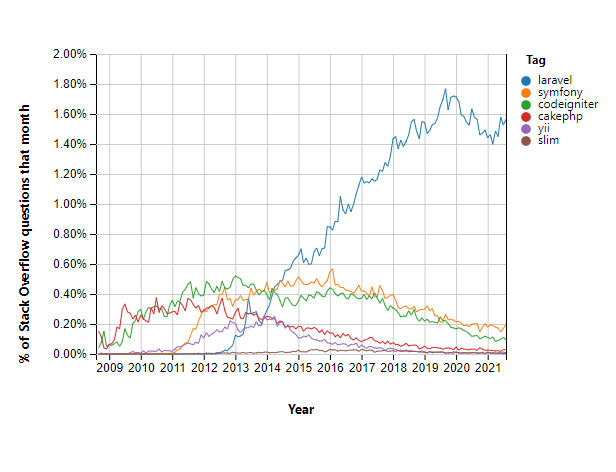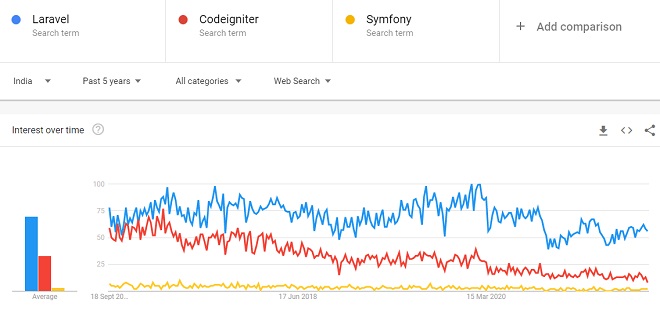When business owners and entrepreneurs think of developing top-notch web applications in record-breaking time, PHP is one of the programming languages that come to their minds.
Thus, it’s no surprise to witness the popularity of PHP frameworks among developers and businesses for web development and especially – Laravel vs. CodeIgniter vs. Symfony.
What’s the reason behind an exponential rise in usage of PHP frameworks?
Well, the top reason is PHP frameworks enable faster development due to a lot of built-in libraries and tools.
If you’re having a hard time deciding whether to choose Laravel, CodeIgniter or Symfony, this post is exclusively for you. Let’s begin with some interesting stats related to these frameworks.
Laravel vs. CodeIgniter vs. Symfony – The Top Three PHP Frameworks
 Did you know? According to Stack Overflow Trends, the top three PHP frameworks are Laravel, Symfony and CodeIgniter – out of all other PHP frameworks.
Did you know? According to Stack Overflow Trends, the top three PHP frameworks are Laravel, Symfony and CodeIgniter – out of all other PHP frameworks.
What’s more? If we see websites powered by each framework, you’ll be astonished to see the number.
- Laravel powers 737,158 live websites, out of which 335,207 are in the US
- The number of live websites built using CodeIgniter is 556,403
- Around 55,244 live websites are built with Symfony
Source: Builtwith
If it’s your first time using these PHP frameworks, below is a quick overview of each framework – the key features that make them stand out. Have a look!!
An Overview to Laravel vs. CodeIgniter vs. Symfony
Laravel, CodeIgniter and Symfony are PHP frameworks that speed up the web development process. Each framework has its own unique capabilities and limitations.
Before getting to the in-depth comparison of Laravel vs. CodeIgniter vs. Symfony, let’s first have a look at a quick overview of each framework. This will help you understand key differences between each framework.
What is Laravel?
Developed by Taylor Otwell, Laravel is a free and open-source web development framework. It follows the MVC (model-view-controller) model and reuses the existing components of other PHP frameworks such as Yii, CodeIgniter and programming languages such as Ruby on Rails.
Here are key features of the Laravel framework:
- Expressive and elegant syntax – speeds up the entire development process
- Comes with 15+ built-in libraries that facilitate common tasks such as user authentication, routing, cashing and others
- Blade template engine that eases building complex web application layouts
- Support automated and unit testing that faster the entire web app testing process
- Eloquent ORM eliminates the need to be familiar with SQL to update or modify databases. Instead, developers can use PHP syntax to do so
What is CodeIgniter?
Developed by EllisLab in 2006, CodeIgniter is a powerful web development framework. Unlike other PHP frameworks out there, it has a very small footprint. The framework was exclusively introduced for developers who crave a simple yet elegant toolkit to build full-featured web applications.
Here are key features of the CodeIgniter framework:
- Comes with in-built security features to protect web apps from common security threats
- Doesn’t force to implement MVC pattern but encourage to accelerate the web application development process
- Support creating both frontend and backend part of the web application
- Ensure stress-free migration from server to server
- The framework generates SEO-friendly URLs which helps in delivering a better user experience
What is Symfony?
Symfony is an open-source PHP framework developed by Fabien Potencier in 2005 and sponsored by SensioLabs. The framework was designed to accelerate the development and maintenance of web apps and replace repetitive coding tasks. Most importantly, it was introduced to build robust enterprise-level web applications.
Here are key features of the Symfony framework:
- Comes with a well-organized structure and clean code that makes web development easier
- Flexible – ideal for developing micro-sites and enterprise applications
- Reusability of the code and easier maintenance
- Ensure security against cross-site request forgery & other attacks
- It uses a Twig template engine
Laravel vs. CodeIgniter vs. Symfony – A Detailed Comparison
Now, let’s go more in-depth and compare all these PHP frameworks on the basis of key factors that you should consider while determining which one to pick for your project.
1. Use Cases
Have a look at common uses cases of Laravel, CodeIgniter and Symfony as PHP framework for web development and some of the widely known apps built with these frameworks.
Laravel
There are many interesting websites built with Laravel including Invoice Ninja, Laracasts, Barchart and MyRank.
Considering that, Laravel framework is ideal for building:
- eLearning web applications
- Content management systemsPortal web applications like job portals and forums
- SaaS-based web applications
- Performance monitoring web applications
CodeIgniter
Popular websites built using CodeIgniter are Firstcry.com, Franchise.com, Woobox.com, Website Builder Expert and more.
Therefore, CodeIgniter is ideal for building:
- eCommerce web applications
- Fully customized CRM
- On-demand web applications
- SaaS-based web applications
- Portal web applications
Symfony
Symfony powers many popular web applications and websites including Spotify, Trivago, Dailymotion, Vogue and more.
Considering that, Symfony is ideal for building:
- Content management systems
- Music apps
- Social networking websites
- Enterprise-grade applications
2. Market Popularity and Community
 As per Google Trends, the interest over time for Laravel has remained high over other PHP frameworks for the last five years.
As per Google Trends, the interest over time for Laravel has remained high over other PHP frameworks for the last five years.
But before coming to any conclusion, let’s have a look at how vast is the community around each PHP framework. After all, a well-connected and strong community of users helps troubleshoot or ease the implementation of the technology.
Laravel
Laravel has extensive community support with more than 45,000 active users and 66.4k GitHub stars. You can find the Laravel community in several places – Laracasts, Laravel.io, GitHub – to name a few.
CodeIgniter
CodeIgniter has a decent community with an 18.2k star rating and more than 1.8k users on GitHub. Other places where you can find community around this technology are CodeIgniter forums and StackOverflow.
Symfony
Like other PHP frameworks, Symfony also has great community support with a 25.8k star rating and more than 69k users on GitHub. Other places where here you can find community around Symfony include SymfonyConnect, Slack and Reddit.
3. Architecture
When selecting a backend framework, it’s important to look at what type of architecture does framework support as it affects the overall performance and scalability of the web application. so, let’s have a peek!
Laravel
Laravel is based on the Model-View-Controller (MVC) pattern that makes it easy for developers to work together due to a tight separation between logic and presentation layers. As a result, the development of large applications using Laravel becomes easy.
CodeIgniter
Unlike other PHP frameworks out there, CodeIgniter doesn’t force developers to implement the MVC model but encourages them to fast-track and simplify the development of complex web applications.
Symfony
Like other PHP frameworks, Symfony also follows Model-View-Controller (MVC) pattern that separates the business logic from the presentation layer.
4. Database Support
When working with a database, you would indeed like to know whether the PHP framework you have selected is supported by databases you’re familiar with. Isn’t, it right? So, let’s have a look at database support for each framework.
Laravel
At present, Laravel supports four databases – MySQL, Postgres, SQLite and SQL Server.
CodeIgniter
CodeIgniter comes prepacked with a full-featured and quite fast abstracted database class that provides support for both traditional structures as well as Query Builder patterns. Here are a few supported databases for the framework: MySQL (5.1+) via the MySQLi driver, MSSQL via the SQLSRV driver and PostgreSQL via the Postgre driver.
Symfony
Symfony comes with all necessary tools to use databases in web applications due to Doctrine – the suite of PHP libraries to work with databases. As a result, the framework supports numerous databases including MySQL, PostgreSQL and MongoDB – to name a few.
5. Budget Consideration
Before hiring a backend developer for a particular skill – Laravel vs. CodeIgniter vs. Symfony, you should know the average salary of the developer you want to employ. This, in turn, will help you define the budget for your next web development project.
| Skill | Avg. Base Salary (per year) |
| Laravel | $78k |
| CodeIgniter | $90k |
| Symfony | $96k |
Source: PayScale, ZipRecruiter
Laravel
With a vast community around Laravel, you can easily find a Laravel developer for your development needs. Some of the key technical skills you should look for while hiring a Laravel developer include:
- Expertise in HTML, CSS and JavaScript
- Expertise in database management systems you use and Laravel supports
- Strong understanding of MVC model and object-oriented programming in PHP
Also Read (That Might Interest You): How Much Does It Cost to Hire a Dedicated Laravel Developer?
CodeIgniter
Finding CodeIgniter developers is also easy especially if you collaborate with a web development company. While hiring CodeIgniter developers, the technical skills you should look for are:
- Expertise in PHP, JavaScript, XML, HTML and CSS
- Knowledge of database management systems such as MySQL.
- MVC frameworks expertise
Symfony
With a great community around Symfony, you can easily find a Symfony developer for hire. You can even hire a PHP developer with a solid understanding of the Symfony framework.
Nevertheless, the technical skills you should look for while hiring Symfony developers.
- Expertise in front-end and back-end technologies
- Symfony bundles
- Knowledge of the MVC model
A Quick Comparison – Laravel vs. CodeIgniter vs. Symfony
Here’s what you should know from a detailed comparison of three popular PHP frameworks.
| Attributes | Laravel | CodeIgniter | Symfony |
| Type | PHP Framework | PHP Framework | PHP Framework |
| Base Language | PHP | PHP | PHP |
| Architecture | MVC | MVC | MVC |
| Database Support | Yes | Yes | Yes |
| Use Cases | Barchart, MyRank | Firstcry, Woobox | Spotify, Trivago |
| GitHub Stars | 66.4k | 18.2k | 25.8k |
| Community | Extensive | Decent | Great |
Reduce Development Costs with Hiring Remote Developers
Today, companies of all sizes hire remote teams with the goal to expand their horizons to employ the best talent for their project needs while saving costs to a greater extent. Hiring an in-house developer or team means – be ready to invest in infrastructure and training costs.
On the other hand, you get to save on both when you decide to hire remote developers.
- Remote developers from an IT vendor are already pre-screened and trained further to deliver bespoke web development solutions.
- There is no need to install and maintain infrastructure and technology equipment. The IT vendor instead takes care of everything so that your remote team can work efficiently and securely on your projects.
Also Read: How to Recruit and Hire Remote Employees – Then Retain Them?
We at InfoStride go one step further when it comes to deploying remote developers for our clients by taking care of all legal concerns so that you don’t face any problems down the road.
Interested? Contact us today to discuss your project requirements or clear any doubts you have in mind about hiring remote developers.
Conclusion
One thing is sure, PHP frameworks ease the whole development process. But each framework has its own advantages and limitations.
Which PHP framework is ideal depends upon your project requirements and the kind of application you want to develop. Whatever you decide, you can hire a remote backend developer with the skill and expertise required to materialize your app idea.
What are your thoughts on Laravel vs. CodeIgniter vs. Symfony? Is there any clear winner? Let us know in the comments below!
THE AUTHOR
harish6854





